The Profound Impact of Laughter on Physical and Psychological Health
VerifiedAdded on 2020/03/23
|6
|2011
|194
Essay
AI Summary
This essay examines the multifaceted effects of laughter on human health, encompassing both physical and psychological dimensions. It explores the physiological benefits, such as increased blood flow, improved respiratory function, and a strengthened immune system, highlighting how laughter can reduce stress hormones and promote overall well-being. The essay also delves into the psychological advantages, including improved mood, enhanced social interaction, and the ability to manage intrusive thoughts and anxieties. It emphasizes laughter's role in fostering positive emotions, building confidence, and promoting mental resilience. Drawing on various research sources, the essay concludes that incorporating laughter into daily routines can be a beneficial practice for improving both physical and mental health, acting as a natural remedy without side effects.
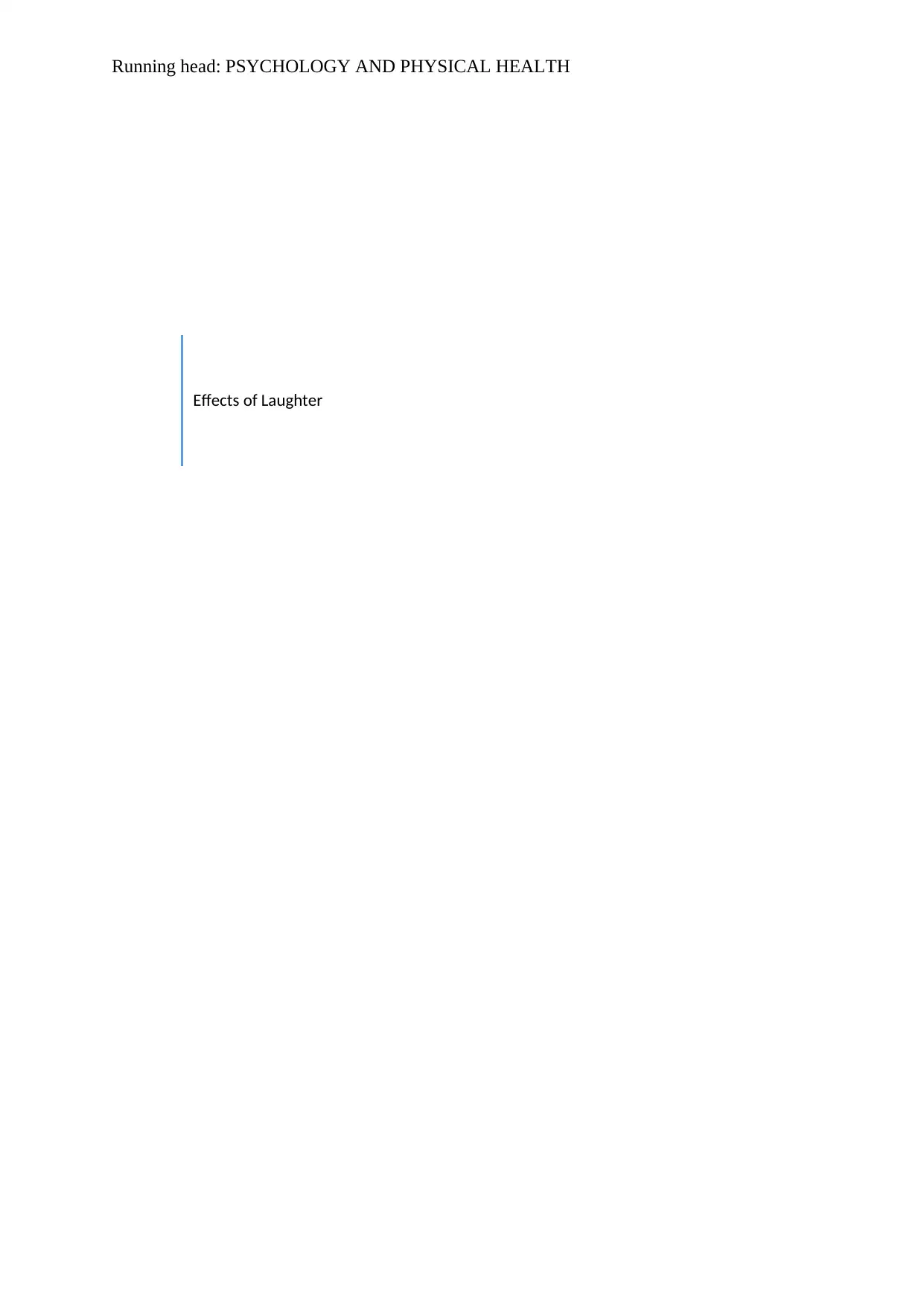
Running head: PSYCHOLOGY AND PHYSICAL HEALTH
Effects of Laughter
Effects of Laughter
Paraphrase This Document
Need a fresh take? Get an instant paraphrase of this document with our AI Paraphraser
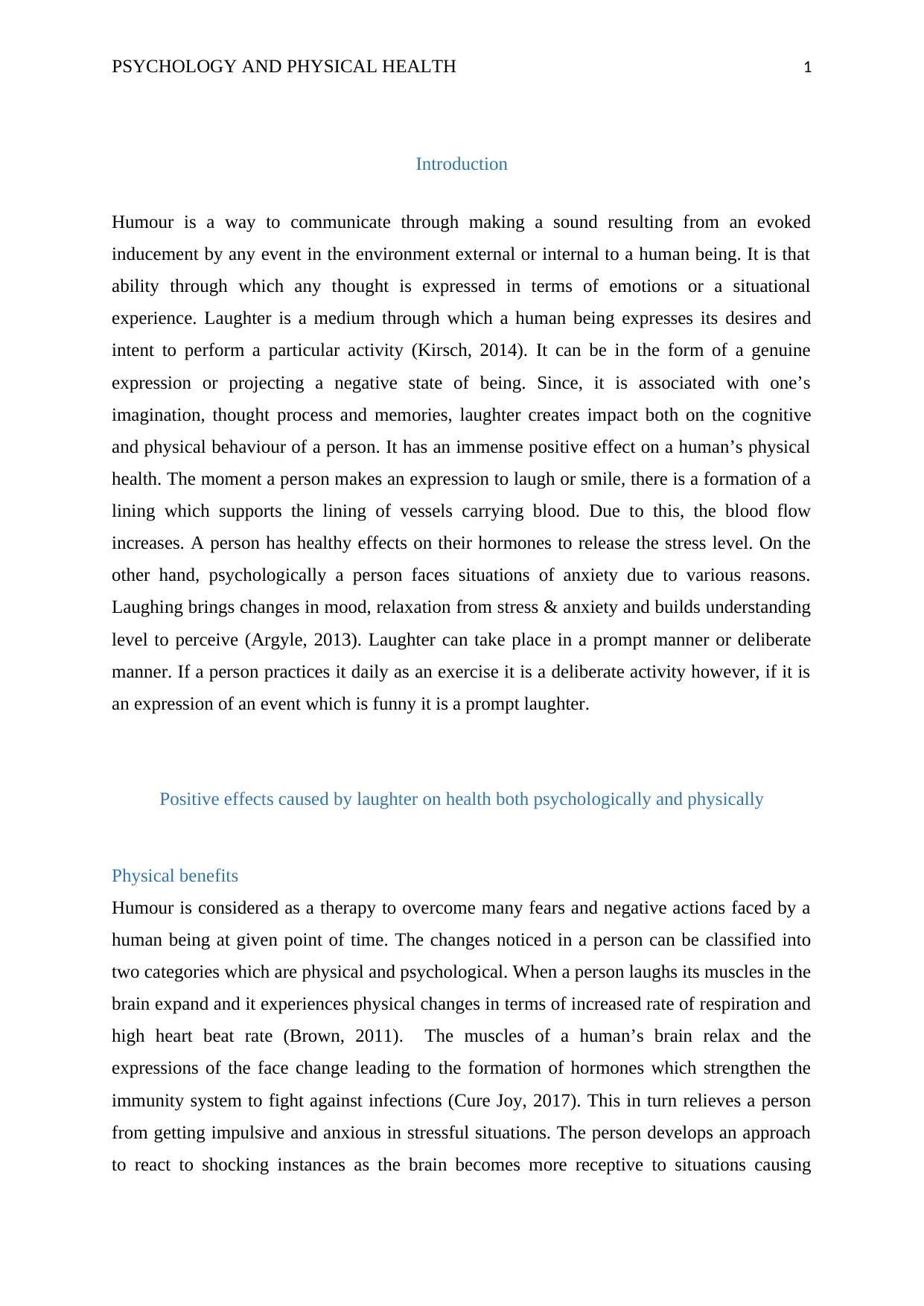
PSYCHOLOGY AND PHYSICAL HEALTH 1
Introduction
Humour is a way to communicate through making a sound resulting from an evoked
inducement by any event in the environment external or internal to a human being. It is that
ability through which any thought is expressed in terms of emotions or a situational
experience. Laughter is a medium through which a human being expresses its desires and
intent to perform a particular activity (Kirsch, 2014). It can be in the form of a genuine
expression or projecting a negative state of being. Since, it is associated with one’s
imagination, thought process and memories, laughter creates impact both on the cognitive
and physical behaviour of a person. It has an immense positive effect on a human’s physical
health. The moment a person makes an expression to laugh or smile, there is a formation of a
lining which supports the lining of vessels carrying blood. Due to this, the blood flow
increases. A person has healthy effects on their hormones to release the stress level. On the
other hand, psychologically a person faces situations of anxiety due to various reasons.
Laughing brings changes in mood, relaxation from stress & anxiety and builds understanding
level to perceive (Argyle, 2013). Laughter can take place in a prompt manner or deliberate
manner. If a person practices it daily as an exercise it is a deliberate activity however, if it is
an expression of an event which is funny it is a prompt laughter.
Positive effects caused by laughter on health both psychologically and physically
Physical benefits
Humour is considered as a therapy to overcome many fears and negative actions faced by a
human being at given point of time. The changes noticed in a person can be classified into
two categories which are physical and psychological. When a person laughs its muscles in the
brain expand and it experiences physical changes in terms of increased rate of respiration and
high heart beat rate (Brown, 2011). The muscles of a human’s brain relax and the
expressions of the face change leading to the formation of hormones which strengthen the
immunity system to fight against infections (Cure Joy, 2017). This in turn relieves a person
from getting impulsive and anxious in stressful situations. The person develops an approach
to react to shocking instances as the brain becomes more receptive to situations causing
Introduction
Humour is a way to communicate through making a sound resulting from an evoked
inducement by any event in the environment external or internal to a human being. It is that
ability through which any thought is expressed in terms of emotions or a situational
experience. Laughter is a medium through which a human being expresses its desires and
intent to perform a particular activity (Kirsch, 2014). It can be in the form of a genuine
expression or projecting a negative state of being. Since, it is associated with one’s
imagination, thought process and memories, laughter creates impact both on the cognitive
and physical behaviour of a person. It has an immense positive effect on a human’s physical
health. The moment a person makes an expression to laugh or smile, there is a formation of a
lining which supports the lining of vessels carrying blood. Due to this, the blood flow
increases. A person has healthy effects on their hormones to release the stress level. On the
other hand, psychologically a person faces situations of anxiety due to various reasons.
Laughing brings changes in mood, relaxation from stress & anxiety and builds understanding
level to perceive (Argyle, 2013). Laughter can take place in a prompt manner or deliberate
manner. If a person practices it daily as an exercise it is a deliberate activity however, if it is
an expression of an event which is funny it is a prompt laughter.
Positive effects caused by laughter on health both psychologically and physically
Physical benefits
Humour is considered as a therapy to overcome many fears and negative actions faced by a
human being at given point of time. The changes noticed in a person can be classified into
two categories which are physical and psychological. When a person laughs its muscles in the
brain expand and it experiences physical changes in terms of increased rate of respiration and
high heart beat rate (Brown, 2011). The muscles of a human’s brain relax and the
expressions of the face change leading to the formation of hormones which strengthen the
immunity system to fight against infections (Cure Joy, 2017). This in turn relieves a person
from getting impulsive and anxious in stressful situations. The person develops an approach
to react to shocking instances as the brain becomes more receptive to situations causing
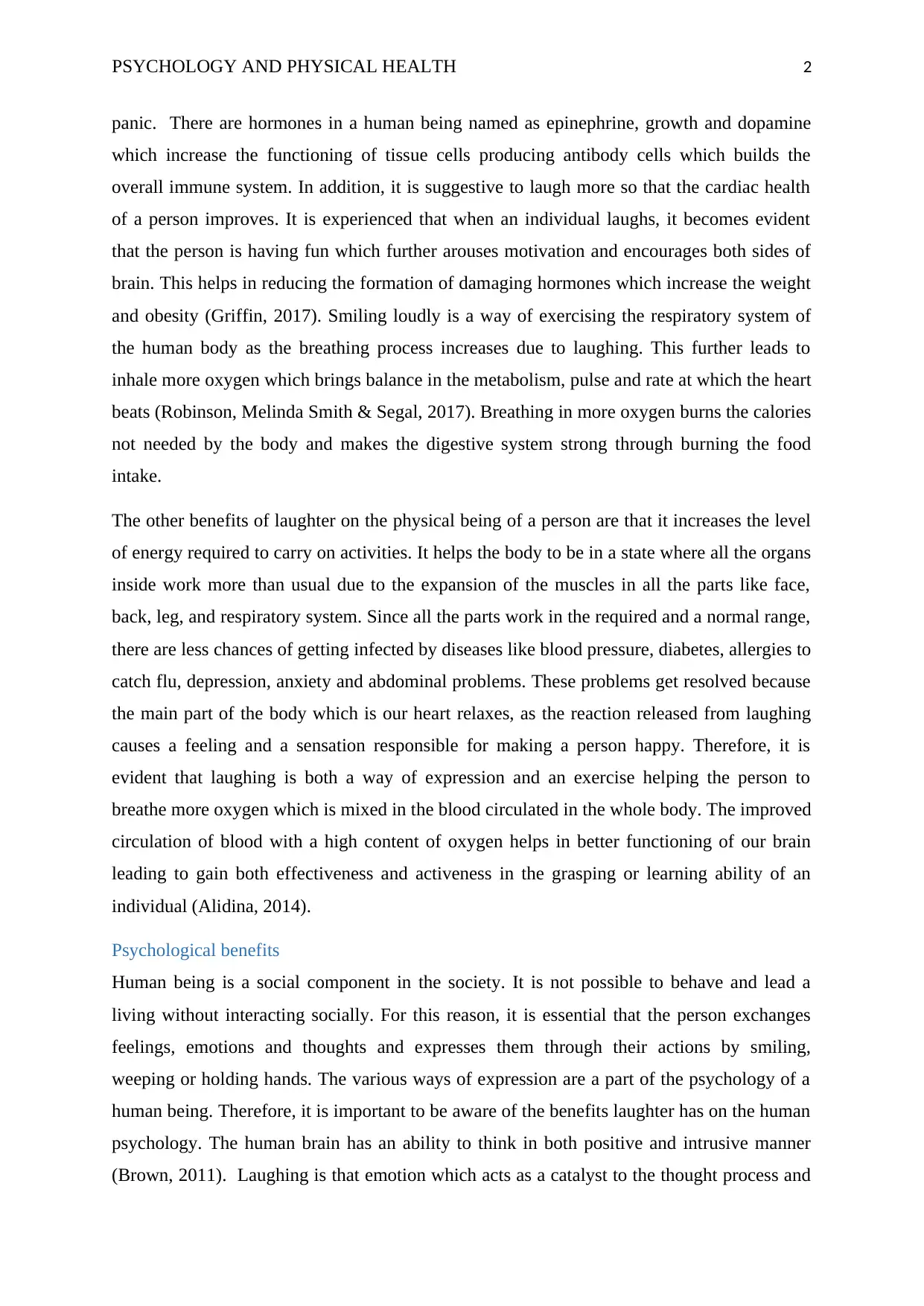
PSYCHOLOGY AND PHYSICAL HEALTH 2
panic. There are hormones in a human being named as epinephrine, growth and dopamine
which increase the functioning of tissue cells producing antibody cells which builds the
overall immune system. In addition, it is suggestive to laugh more so that the cardiac health
of a person improves. It is experienced that when an individual laughs, it becomes evident
that the person is having fun which further arouses motivation and encourages both sides of
brain. This helps in reducing the formation of damaging hormones which increase the weight
and obesity (Griffin, 2017). Smiling loudly is a way of exercising the respiratory system of
the human body as the breathing process increases due to laughing. This further leads to
inhale more oxygen which brings balance in the metabolism, pulse and rate at which the heart
beats (Robinson, Melinda Smith & Segal, 2017). Breathing in more oxygen burns the calories
not needed by the body and makes the digestive system strong through burning the food
intake.
The other benefits of laughter on the physical being of a person are that it increases the level
of energy required to carry on activities. It helps the body to be in a state where all the organs
inside work more than usual due to the expansion of the muscles in all the parts like face,
back, leg, and respiratory system. Since all the parts work in the required and a normal range,
there are less chances of getting infected by diseases like blood pressure, diabetes, allergies to
catch flu, depression, anxiety and abdominal problems. These problems get resolved because
the main part of the body which is our heart relaxes, as the reaction released from laughing
causes a feeling and a sensation responsible for making a person happy. Therefore, it is
evident that laughing is both a way of expression and an exercise helping the person to
breathe more oxygen which is mixed in the blood circulated in the whole body. The improved
circulation of blood with a high content of oxygen helps in better functioning of our brain
leading to gain both effectiveness and activeness in the grasping or learning ability of an
individual (Alidina, 2014).
Psychological benefits
Human being is a social component in the society. It is not possible to behave and lead a
living without interacting socially. For this reason, it is essential that the person exchanges
feelings, emotions and thoughts and expresses them through their actions by smiling,
weeping or holding hands. The various ways of expression are a part of the psychology of a
human being. Therefore, it is important to be aware of the benefits laughter has on the human
psychology. The human brain has an ability to think in both positive and intrusive manner
(Brown, 2011). Laughing is that emotion which acts as a catalyst to the thought process and
panic. There are hormones in a human being named as epinephrine, growth and dopamine
which increase the functioning of tissue cells producing antibody cells which builds the
overall immune system. In addition, it is suggestive to laugh more so that the cardiac health
of a person improves. It is experienced that when an individual laughs, it becomes evident
that the person is having fun which further arouses motivation and encourages both sides of
brain. This helps in reducing the formation of damaging hormones which increase the weight
and obesity (Griffin, 2017). Smiling loudly is a way of exercising the respiratory system of
the human body as the breathing process increases due to laughing. This further leads to
inhale more oxygen which brings balance in the metabolism, pulse and rate at which the heart
beats (Robinson, Melinda Smith & Segal, 2017). Breathing in more oxygen burns the calories
not needed by the body and makes the digestive system strong through burning the food
intake.
The other benefits of laughter on the physical being of a person are that it increases the level
of energy required to carry on activities. It helps the body to be in a state where all the organs
inside work more than usual due to the expansion of the muscles in all the parts like face,
back, leg, and respiratory system. Since all the parts work in the required and a normal range,
there are less chances of getting infected by diseases like blood pressure, diabetes, allergies to
catch flu, depression, anxiety and abdominal problems. These problems get resolved because
the main part of the body which is our heart relaxes, as the reaction released from laughing
causes a feeling and a sensation responsible for making a person happy. Therefore, it is
evident that laughing is both a way of expression and an exercise helping the person to
breathe more oxygen which is mixed in the blood circulated in the whole body. The improved
circulation of blood with a high content of oxygen helps in better functioning of our brain
leading to gain both effectiveness and activeness in the grasping or learning ability of an
individual (Alidina, 2014).
Psychological benefits
Human being is a social component in the society. It is not possible to behave and lead a
living without interacting socially. For this reason, it is essential that the person exchanges
feelings, emotions and thoughts and expresses them through their actions by smiling,
weeping or holding hands. The various ways of expression are a part of the psychology of a
human being. Therefore, it is important to be aware of the benefits laughter has on the human
psychology. The human brain has an ability to think in both positive and intrusive manner
(Brown, 2011). Laughing is that emotion which acts as a catalyst to the thought process and
⊘ This is a preview!⊘
Do you want full access?
Subscribe today to unlock all pages.

Trusted by 1+ million students worldwide
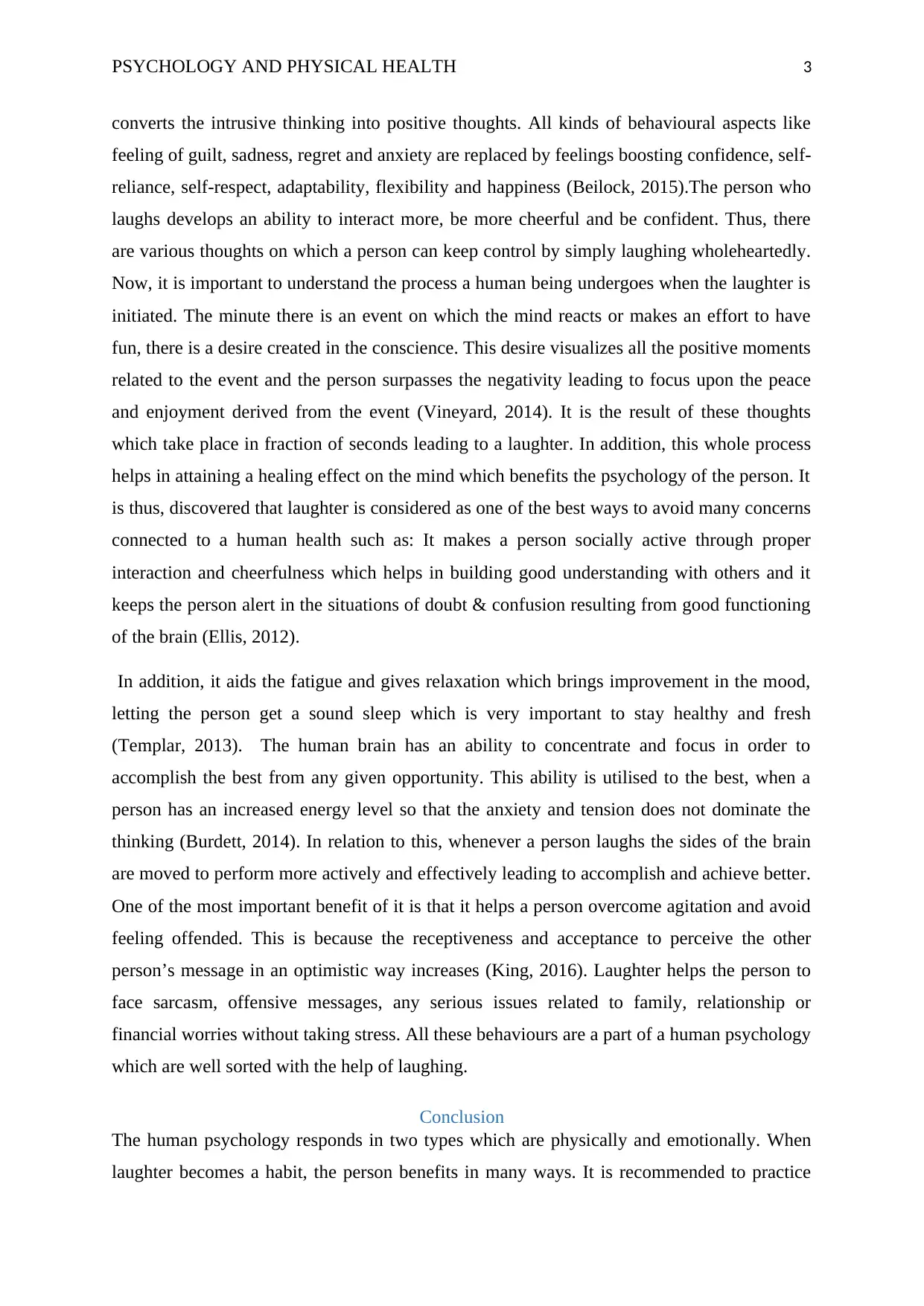
PSYCHOLOGY AND PHYSICAL HEALTH 3
converts the intrusive thinking into positive thoughts. All kinds of behavioural aspects like
feeling of guilt, sadness, regret and anxiety are replaced by feelings boosting confidence, self-
reliance, self-respect, adaptability, flexibility and happiness (Beilock, 2015).The person who
laughs develops an ability to interact more, be more cheerful and be confident. Thus, there
are various thoughts on which a person can keep control by simply laughing wholeheartedly.
Now, it is important to understand the process a human being undergoes when the laughter is
initiated. The minute there is an event on which the mind reacts or makes an effort to have
fun, there is a desire created in the conscience. This desire visualizes all the positive moments
related to the event and the person surpasses the negativity leading to focus upon the peace
and enjoyment derived from the event (Vineyard, 2014). It is the result of these thoughts
which take place in fraction of seconds leading to a laughter. In addition, this whole process
helps in attaining a healing effect on the mind which benefits the psychology of the person. It
is thus, discovered that laughter is considered as one of the best ways to avoid many concerns
connected to a human health such as: It makes a person socially active through proper
interaction and cheerfulness which helps in building good understanding with others and it
keeps the person alert in the situations of doubt & confusion resulting from good functioning
of the brain (Ellis, 2012).
In addition, it aids the fatigue and gives relaxation which brings improvement in the mood,
letting the person get a sound sleep which is very important to stay healthy and fresh
(Templar, 2013). The human brain has an ability to concentrate and focus in order to
accomplish the best from any given opportunity. This ability is utilised to the best, when a
person has an increased energy level so that the anxiety and tension does not dominate the
thinking (Burdett, 2014). In relation to this, whenever a person laughs the sides of the brain
are moved to perform more actively and effectively leading to accomplish and achieve better.
One of the most important benefit of it is that it helps a person overcome agitation and avoid
feeling offended. This is because the receptiveness and acceptance to perceive the other
person’s message in an optimistic way increases (King, 2016). Laughter helps the person to
face sarcasm, offensive messages, any serious issues related to family, relationship or
financial worries without taking stress. All these behaviours are a part of a human psychology
which are well sorted with the help of laughing.
Conclusion
The human psychology responds in two types which are physically and emotionally. When
laughter becomes a habit, the person benefits in many ways. It is recommended to practice
converts the intrusive thinking into positive thoughts. All kinds of behavioural aspects like
feeling of guilt, sadness, regret and anxiety are replaced by feelings boosting confidence, self-
reliance, self-respect, adaptability, flexibility and happiness (Beilock, 2015).The person who
laughs develops an ability to interact more, be more cheerful and be confident. Thus, there
are various thoughts on which a person can keep control by simply laughing wholeheartedly.
Now, it is important to understand the process a human being undergoes when the laughter is
initiated. The minute there is an event on which the mind reacts or makes an effort to have
fun, there is a desire created in the conscience. This desire visualizes all the positive moments
related to the event and the person surpasses the negativity leading to focus upon the peace
and enjoyment derived from the event (Vineyard, 2014). It is the result of these thoughts
which take place in fraction of seconds leading to a laughter. In addition, this whole process
helps in attaining a healing effect on the mind which benefits the psychology of the person. It
is thus, discovered that laughter is considered as one of the best ways to avoid many concerns
connected to a human health such as: It makes a person socially active through proper
interaction and cheerfulness which helps in building good understanding with others and it
keeps the person alert in the situations of doubt & confusion resulting from good functioning
of the brain (Ellis, 2012).
In addition, it aids the fatigue and gives relaxation which brings improvement in the mood,
letting the person get a sound sleep which is very important to stay healthy and fresh
(Templar, 2013). The human brain has an ability to concentrate and focus in order to
accomplish the best from any given opportunity. This ability is utilised to the best, when a
person has an increased energy level so that the anxiety and tension does not dominate the
thinking (Burdett, 2014). In relation to this, whenever a person laughs the sides of the brain
are moved to perform more actively and effectively leading to accomplish and achieve better.
One of the most important benefit of it is that it helps a person overcome agitation and avoid
feeling offended. This is because the receptiveness and acceptance to perceive the other
person’s message in an optimistic way increases (King, 2016). Laughter helps the person to
face sarcasm, offensive messages, any serious issues related to family, relationship or
financial worries without taking stress. All these behaviours are a part of a human psychology
which are well sorted with the help of laughing.
Conclusion
The human psychology responds in two types which are physically and emotionally. When
laughter becomes a habit, the person benefits in many ways. It is recommended to practice
Paraphrase This Document
Need a fresh take? Get an instant paraphrase of this document with our AI Paraphraser
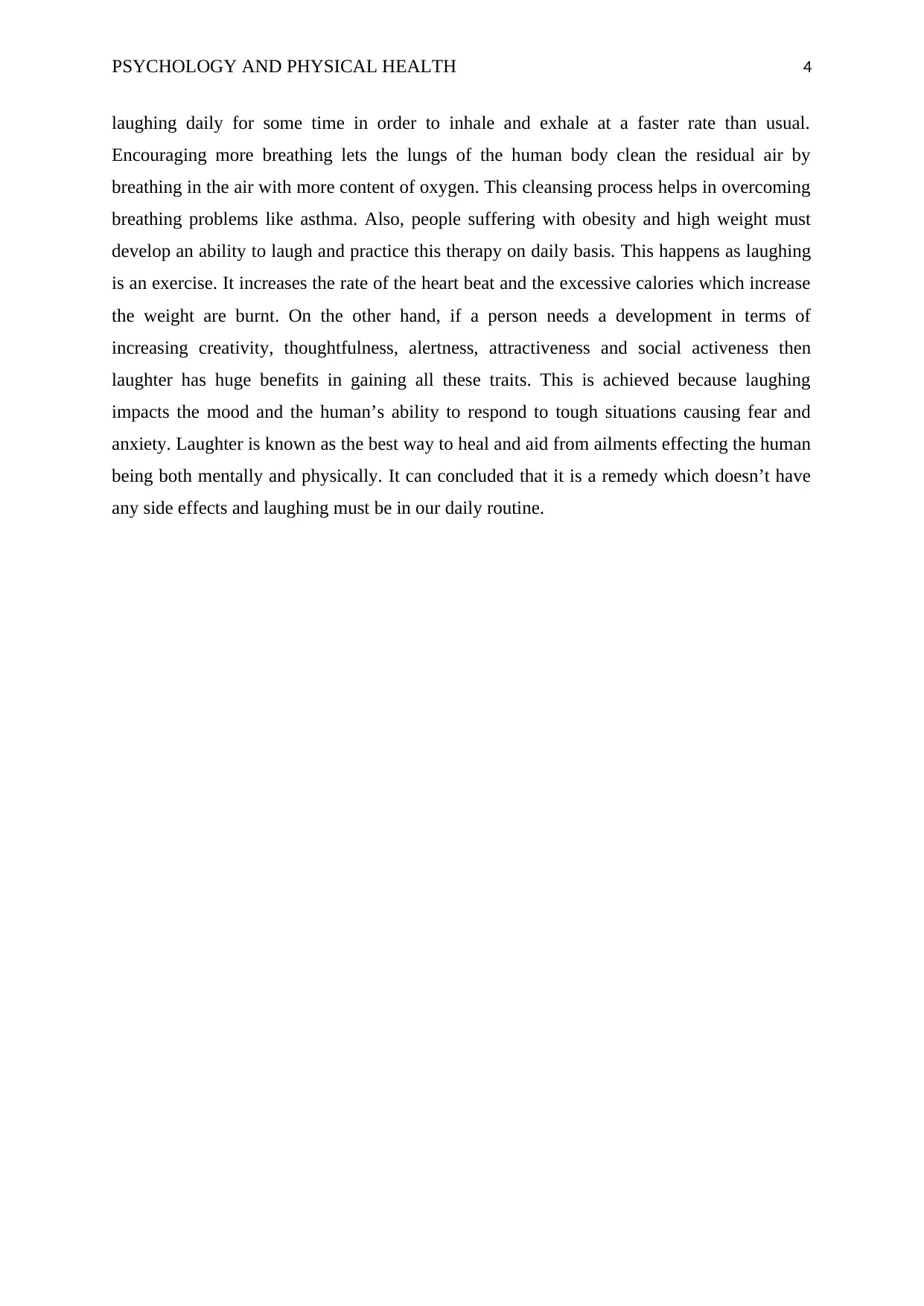
PSYCHOLOGY AND PHYSICAL HEALTH 4
laughing daily for some time in order to inhale and exhale at a faster rate than usual.
Encouraging more breathing lets the lungs of the human body clean the residual air by
breathing in the air with more content of oxygen. This cleansing process helps in overcoming
breathing problems like asthma. Also, people suffering with obesity and high weight must
develop an ability to laugh and practice this therapy on daily basis. This happens as laughing
is an exercise. It increases the rate of the heart beat and the excessive calories which increase
the weight are burnt. On the other hand, if a person needs a development in terms of
increasing creativity, thoughtfulness, alertness, attractiveness and social activeness then
laughter has huge benefits in gaining all these traits. This is achieved because laughing
impacts the mood and the human’s ability to respond to tough situations causing fear and
anxiety. Laughter is known as the best way to heal and aid from ailments effecting the human
being both mentally and physically. It can concluded that it is a remedy which doesn’t have
any side effects and laughing must be in our daily routine.
laughing daily for some time in order to inhale and exhale at a faster rate than usual.
Encouraging more breathing lets the lungs of the human body clean the residual air by
breathing in the air with more content of oxygen. This cleansing process helps in overcoming
breathing problems like asthma. Also, people suffering with obesity and high weight must
develop an ability to laugh and practice this therapy on daily basis. This happens as laughing
is an exercise. It increases the rate of the heart beat and the excessive calories which increase
the weight are burnt. On the other hand, if a person needs a development in terms of
increasing creativity, thoughtfulness, alertness, attractiveness and social activeness then
laughter has huge benefits in gaining all these traits. This is achieved because laughing
impacts the mood and the human’s ability to respond to tough situations causing fear and
anxiety. Laughter is known as the best way to heal and aid from ailments effecting the human
being both mentally and physically. It can concluded that it is a remedy which doesn’t have
any side effects and laughing must be in our daily routine.
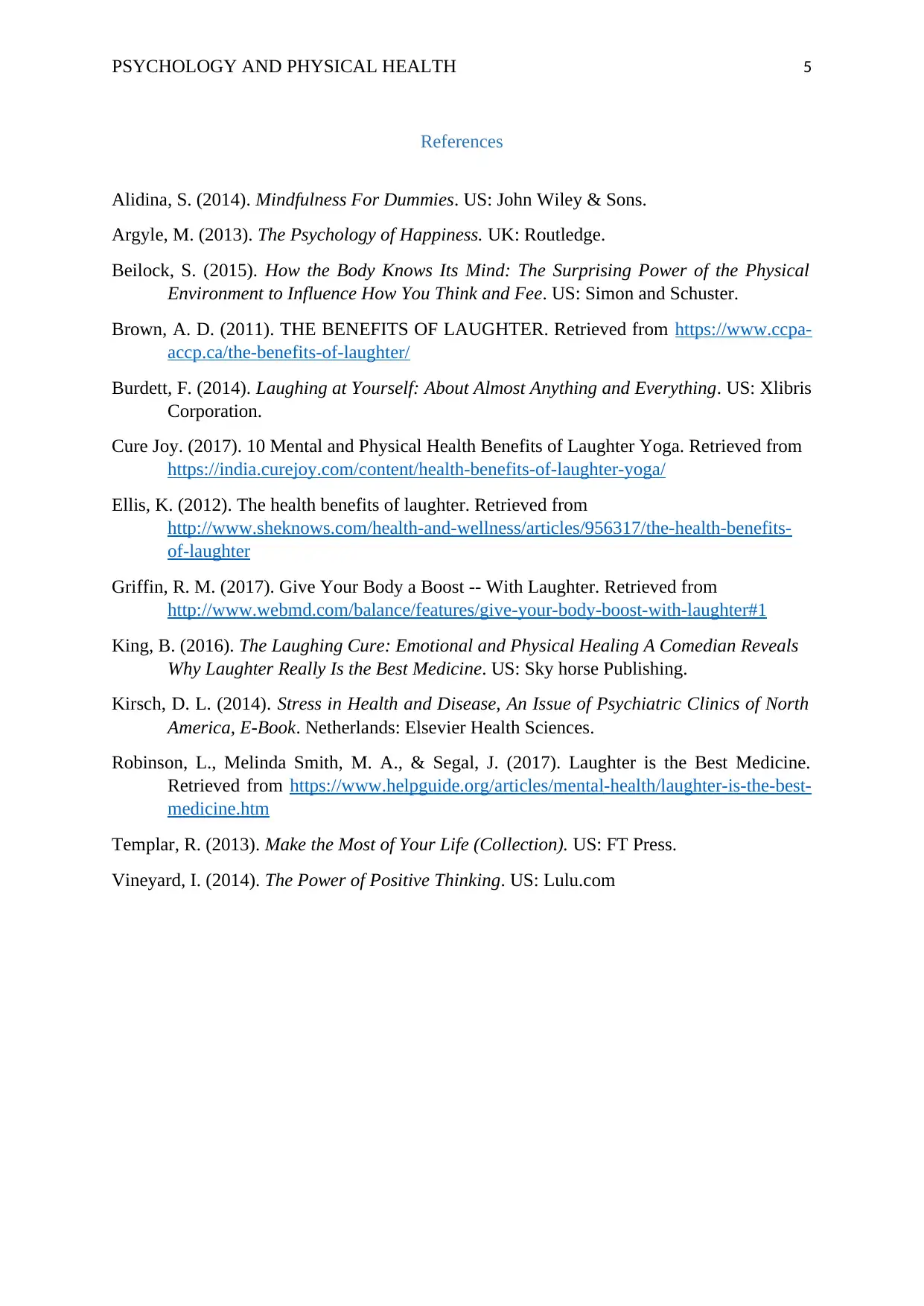
PSYCHOLOGY AND PHYSICAL HEALTH 5
References
Alidina, S. (2014). Mindfulness For Dummies. US: John Wiley & Sons.
Argyle, M. (2013). The Psychology of Happiness. UK: Routledge.
Beilock, S. (2015). How the Body Knows Its Mind: The Surprising Power of the Physical
Environment to Influence How You Think and Fee. US: Simon and Schuster.
Brown, A. D. (2011). THE BENEFITS OF LAUGHTER. Retrieved from https://www.ccpa-
accp.ca/the-benefits-of-laughter/
Burdett, F. (2014). Laughing at Yourself: About Almost Anything and Everything. US: Xlibris
Corporation.
Cure Joy. (2017). 10 Mental and Physical Health Benefits of Laughter Yoga. Retrieved from
https://india.curejoy.com/content/health-benefits-of-laughter-yoga/
Ellis, K. (2012). The health benefits of laughter. Retrieved from
http://www.sheknows.com/health-and-wellness/articles/956317/the-health-benefits-
of-laughter
Griffin, R. M. (2017). Give Your Body a Boost -- With Laughter. Retrieved from
http://www.webmd.com/balance/features/give-your-body-boost-with-laughter#1
King, B. (2016). The Laughing Cure: Emotional and Physical Healing A Comedian Reveals
Why Laughter Really Is the Best Medicine. US: Sky horse Publishing.
Kirsch, D. L. (2014). Stress in Health and Disease, An Issue of Psychiatric Clinics of North
America, E-Book. Netherlands: Elsevier Health Sciences.
Robinson, L., Melinda Smith, M. A., & Segal, J. (2017). Laughter is the Best Medicine.
Retrieved from https://www.helpguide.org/articles/mental-health/laughter-is-the-best-
medicine.htm
Templar, R. (2013). Make the Most of Your Life (Collection). US: FT Press.
Vineyard, I. (2014). The Power of Positive Thinking. US: Lulu.com
References
Alidina, S. (2014). Mindfulness For Dummies. US: John Wiley & Sons.
Argyle, M. (2013). The Psychology of Happiness. UK: Routledge.
Beilock, S. (2015). How the Body Knows Its Mind: The Surprising Power of the Physical
Environment to Influence How You Think and Fee. US: Simon and Schuster.
Brown, A. D. (2011). THE BENEFITS OF LAUGHTER. Retrieved from https://www.ccpa-
accp.ca/the-benefits-of-laughter/
Burdett, F. (2014). Laughing at Yourself: About Almost Anything and Everything. US: Xlibris
Corporation.
Cure Joy. (2017). 10 Mental and Physical Health Benefits of Laughter Yoga. Retrieved from
https://india.curejoy.com/content/health-benefits-of-laughter-yoga/
Ellis, K. (2012). The health benefits of laughter. Retrieved from
http://www.sheknows.com/health-and-wellness/articles/956317/the-health-benefits-
of-laughter
Griffin, R. M. (2017). Give Your Body a Boost -- With Laughter. Retrieved from
http://www.webmd.com/balance/features/give-your-body-boost-with-laughter#1
King, B. (2016). The Laughing Cure: Emotional and Physical Healing A Comedian Reveals
Why Laughter Really Is the Best Medicine. US: Sky horse Publishing.
Kirsch, D. L. (2014). Stress in Health and Disease, An Issue of Psychiatric Clinics of North
America, E-Book. Netherlands: Elsevier Health Sciences.
Robinson, L., Melinda Smith, M. A., & Segal, J. (2017). Laughter is the Best Medicine.
Retrieved from https://www.helpguide.org/articles/mental-health/laughter-is-the-best-
medicine.htm
Templar, R. (2013). Make the Most of Your Life (Collection). US: FT Press.
Vineyard, I. (2014). The Power of Positive Thinking. US: Lulu.com
⊘ This is a preview!⊘
Do you want full access?
Subscribe today to unlock all pages.

Trusted by 1+ million students worldwide
1 out of 6
Related Documents
Your All-in-One AI-Powered Toolkit for Academic Success.
+13062052269
info@desklib.com
Available 24*7 on WhatsApp / Email
![[object Object]](/_next/static/media/star-bottom.7253800d.svg)
Unlock your academic potential
Copyright © 2020–2026 A2Z Services. All Rights Reserved. Developed and managed by ZUCOL.





